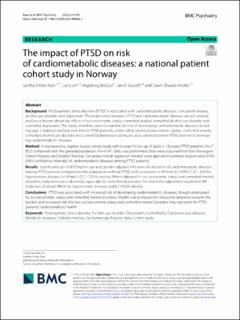| dc.contributor.author | Roer, Grethe Emilie | |
| dc.contributor.author | Lien, Lars | |
| dc.contributor.author | Bolstad, Ingeborg | |
| dc.contributor.author | Aaseth, Jan Olav | |
| dc.contributor.author | Abebe, Dawit Shawel | |
| dc.date.accessioned | 2024-02-23T14:46:19Z | |
| dc.date.available | 2024-02-23T14:46:19Z | |
| dc.date.created | 2023-05-24T13:07:51Z | |
| dc.date.issued | 2023 | |
| dc.identifier.citation | BMC Psychiatry. 2023, 23 (1), . | en_US |
| dc.identifier.issn | 1471-244X | |
| dc.identifier.uri | https://hdl.handle.net/11250/3119715 | |
| dc.description.abstract | Background: Posttraumatic stress disorder (PTSD) is associated with cardiometabolic diseases, concurrent anxiety, alcohol use disorder and depression. The relationship between PTSD and cardiometabolic diseases are still unclear, and less is known about the effects of socioeconomic status, comorbid anxiety, comorbid alcohol use disorder and comorbid depression. The study, therefore, aims to examine the risk of developing cardiometabolic diseases including type 2 diabetes mellitus over time in PTSD patients, and to what extent socioeconomic status, comorbid anxiety, comorbid alcohol use disorder and comorbid depression attenuate associations between PTSD and risk of developing cardiometabolic diseases. Method: A retrospective, register-based cohort study with 6-years follow-up of adult (> 18 years) PTSD patients (N = 7 852) compared with the general population (N = 4 041 366), was performed. Data were acquired from the Norwegian Patient Registry and Statistic Norway. Cox proportional regression models were applied to estimate hazard ratios (HRs) (99% confidence intervals) of cardiometabolic diseases among PTSD patients. Results: Significantly (p < 0.001) higher age and gender adjusted HRs were disclosed for all cardiometabolic diseases among PTSD patients compared to the population without PTSD, with a variation in HR from 3.5 (99% CI 3.1-3.9) for hypertensive diseases to HR = 6.5 (5.7-7.5) for obesity. When adjusted for socioeconomic status and comorbid mental disorders, reductions were observed, especially for comorbid depression, for which the adjustment resulted in HR reduction of about 48.6% for hypertensive diseases and 67.7% for obesity. Conclusions: PTSD was associated with increased risk of developing cardiometabolic diseases, though attenuated by socioeconomic status and comorbid mental disorders. Health care professionals should be attentive towards the burden and increased risk that low socioeconomic status and comorbid mental disorders may represent for PTSD patients' cardiometabolic health. Keywords: Alcohol use disorder; Cardiovascular diseases; Cohort study; Comorbidity; Depression; Diabetes mellitus; Epidemiology; Metabolic diseases; Posttraumatic stress disorder; Register data. © 2023. The Author(s). | en_US |
| dc.description.sponsorship | This research were funded by Innlandet Hospital Trust through the research project awarded to Ph.D. fellow Roer ‘Is traumatic experiences a risk factor for metabolic syndrome and type 2 diabetes mellitus?’ (project number 150632) and from the Southern and Eastern Norway Regional Health Authority through the research project awarded to Professor Abebe ‘Patterns and courses of somatic illness and the utilization of health services among patients with substance use disorders and/or mental disorders in Norway’ (project number 150901). | en_US |
| dc.language.iso | eng | en_US |
| dc.publisher | BioMed Central | en_US |
| dc.rights | Attribution-NonCommercial-NoDerivatives 4.0 Internasjonal | * |
| dc.rights.uri | http://creativecommons.org/licenses/by-nc-nd/4.0/deed.no | * |
| dc.subject | Alcohol use disorder | en_US |
| dc.subject | Cardiovascular diseases | en_US |
| dc.subject | Cohort study | en_US |
| dc.subject | Comorbidity | en_US |
| dc.subject | Depression | en_US |
| dc.subject | Diabetes mellitus | en_US |
| dc.subject | Epidemiology | en_US |
| dc.subject | Metabolic diseases | en_US |
| dc.subject | Posttraumatic stress disorder | en_US |
| dc.subject | Register data | en_US |
| dc.title | The impact of PTSD on risk of cardiometabolic diseases: a national patient cohort study in Norway | en_US |
| dc.title.alternative | The impact of PTSD on risk of cardiometabolic diseases: a national patient cohort study in Norway | en_US |
| dc.type | Peer reviewed | en_US |
| dc.type | Journal article | en_US |
| dc.description.version | publishedVersion | en_US |
| dc.rights.holder | © 2023. The Author(s). This is an open access article distributed under the terms of the Creative Commons CC BY license, which permits unrestricted use, distribution, and reproduction in any medium, provided the original work is properly cited. To view a copy of this licence, visit http://creativecommons.org/licenses/by/4.0/. | en_US |
| dc.source.pagenumber | 9 | en_US |
| dc.source.volume | 23 | en_US |
| dc.source.journal | BMC Psychiatry | en_US |
| dc.source.issue | 1 | en_US |
| dc.identifier.doi | 10.1186/s12888-023-04866-x | |
| dc.identifier.cristin | 2149002 | |
| cristin.ispublished | true | |
| cristin.fulltext | original | |
| cristin.qualitycode | 2 | |

